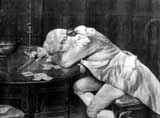| |
|
 |
 |
 |
 |
'Failure' - Salon at Blacks, June 9, 2002
23 participants
Jeremy Ackerman, Danielle Arnaud, Oliver Bennett, Tim Brennan
Viviave Carneiro, JJ Charleson, Marian Couts, Sacha Craddock,
Anthony Fawcett, Peter Fleissig, James Graham, Kathy Haynes,
Sebastian Horsley, Janet Laurence, Tom Lubbock, Guiseppe Mascoli,
Colin McEwan, Mary Moore, Sally O’Reilly, Will Palin, James Putnam,
Norma Rosso, Richard Strange.
Failure is something that we think we can identify for ourselves yet our judgment is inevitably impaired by what we've been told as children by our parents and teachers. At school we're constantly reminded that we'll fail unless we work harder and exams implant the stigma attached to failure which follows us into adult life. Some of us persevere in the face of continued failure refusing to be beaten or as the saying goes 'if at first you don't succeed, try, try, try again'. In contrast others admit their own limitations and resign to failure which allows them to live in the present rather than ruminating about where they have failed.
True acceptance of failure is hard since from an early age we are told how humiliating failure will be and cannot see any of its redeeming aspects. Yet some people bask in their own sense of failure, having convinced themselves they lack the necessary qualities to succeed. Admission to failure thus becomes a renunciation of the responsibility to succeed. The loser, a failure from the establishment's viewpoint can be equated with the anti-hero in romantic literature who challenges and subverts the traditional notion of success. With the anti-hero negation is converted into affirmation so that weakness becomes strength and failure is transformed into success.
The human quest to achieve success is ultimately connected to lifeforce and to the earliest human beings, fear of failure was a basic instinct - failure to find food and sustenance. Cave paintings depict a successful hunt as pictorial magic while the religious beliefs of the first agricultural peoples relate to fertility and fear of the harvest's potential failure. Our lives are still indirectly linked to the cycle of nature - its tendency towards random uncontrollable external influences that can dramatically effect our successes or failures.
|
|
 |
 |
19th century engraving by Frank Hyde
|

|
 |
 |
|
|
|